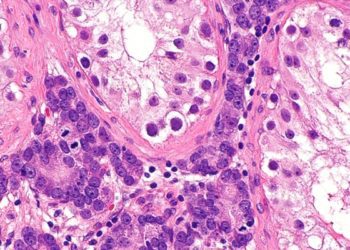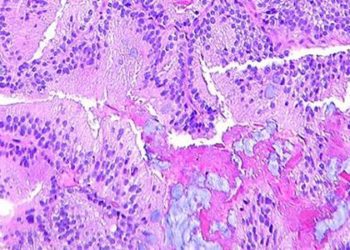The PLCO trial 1: PSA and digital rectal examination in prostate cancer screening [Classics Series]
Image: PD
1. Subjects undergoing annual prostate-specific antigen (PSA) testing for 6 years and annual digital rectal examination (DRE) for 4 years experienced significantly increased incidence of prostate cancer compared to usual care.
2. Screening with PSA testing and DRE does not significantly reduce mortality from prostate cancer compared to usual care.
Original date of publication: March 26, 2009
The Prostate, Lung, Colorectal, and Ovarian (PLCO) Cancer Screening Trial is a large population-based randomized trial sponsored by the National Cancer Institute (NCI) to explore the effects of screening on cancer mortality. The trial has been conducted at 10 different centres across the U.S. Participants randomized to the intervention group receive active screening for PLCO cancers (i.e., chest x-ray, flexible sigmoidoscopy, CA-125, transvaginal ultrasound, PSA, digital rectal examination) in the first 6 years of the trial and are subsequently followed for another 7 years. Participants randomized to the usual care group are managed with usual medical care and are followed for 13 years. The trial began in 1993 and the screening phase of the trial was completed in 2006, though follow-up will continue until 2015. Here, we report on the findings regarding prostate cancer screening using PSA testing and digital rectal examination.
Study Rundown: The combination of PSA testing and DRE has been the standard screening approach for prostate cancer for several decades. While this approach is used by many clinicians in different jurisdictions, there remains a lot of uncertainty regarding the benefits and harms of prostate cancer screening. This has led to the release of conflicting guidelines from different organizations, such as the American Cancer Society and the U.S. Preventative Task Force (USPSTF). The prostate component of the PLCO trial assessed the effect of annual PSA testing for 6 years and annual DRE for 4 years on mortality rates from prostate cancer. Study results showed that screening with PSA testing and DRE was associated with an increased incidence of prostate cancer, but not with a significant reduction in mortality when compared with usual care. Thus, the concern is that prostate cancer screening may expose patients to the risks of overdiagnosis and overtreatment of prostate cancer, with no actual benefit in survival.
The limitations of this study include a relatively high PSA testing and DRE rate in the control group, ranging from 40%-52% for PSA testing and 41%-46% for DRE. This rate of screening in the control group may have reduced the relative difference in prostate cancer mortality between the control and screening groups. Secondly, about 44% of subjects in both groups had undergone one or more PSA tests at baseline, which may have excluded more easily detectable cancers prior to the enrollment in the study, thereby also potentially leading to a reduction in the observed difference in prostate cancer mortality. Finally, it is possible that improvements in prostate cancer therapy equally reduced death from prostate cancer in both experimental groups, thereby dampening the survival benefits of early cancer detection from screening.
In summary, the prostate component of the PLCO trial found that screening with PSA testing and DRE was not associated with significant decreases in prostate cancer mortality.
Click to read the study in NEJM
Click to read the 2 Minute Medicine report of the subsequent PLCO trial 2
In-Depth [randomized, controlled study]: The PLCO trial was a randomized, controlled trial that enrolled 154,900 participants between 55-74 years of age from 10 study centres in the U.S. The exclusion criteria were a history of PLCO cancer, current cancer treatment, and more than one instance of PSA testing in the 3 years prior to enrollment. Of the enrolled participants, 38,343 were assigned to the screening group that received annual PSA testing for 6 years and annual DRE for 4 years, while 38,350 were assigned to the control group. Follow-up is planned for all subjects for at least 13 years, but the results of this study were released with at least 7 years of follow-up for all patients and 10 years of follow-up for 67% of the patients due to public health considerations raised by the study’s results. At 7 years, more subjects in the screening group were diagnosed with prostate cancer than in the control group (rate ratio 1.22; 95%CI 1.16-1.29). This difference persisted for patients with 10 years of follow-up (rate ratio 1.17; 95%CI 1.11-1.22). There was, however, no significant difference in mortality from prostate cancer between the screening and control groups at 7 years (rate ratio 1.16; 95%CI 0.76-1.76) or 10 years of follow-up (rate ratio 1.09; 95%CI 0.76-1.76).
By Evan Chen and Andrew Cheung, MD
© 2012-2014 2minutemedicine.com. All rights reserved. No works may be reproduced without expressed written consent from 2minutemedicine.com. Disclaimer: We present factual information directly from peer reviewed medical journals. No post should be construed as medical advice and is not intended as such by the authors, editors, staff or by 2minutemedicine.com. PLEASE SEE A HEALTHCARE PROVIDER IN YOUR AREA IF YOU SEEK MEDICAL ADVICE OF ANY SORT.




![2 Minute Medicine: Pharma Roundup: Price Hikes, Breakthrough Approvals, Legal Showdowns, Biotech Expansion, and Europe’s Pricing Debate [May 12nd, 2025]](https://www.2minutemedicine.com/wp-content/uploads/2025/05/ChatGPT-Image-May-12-2025-at-10_22_23-AM-350x250.png)




